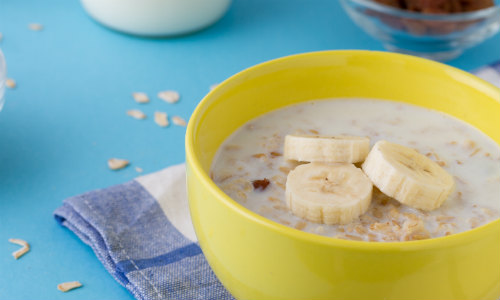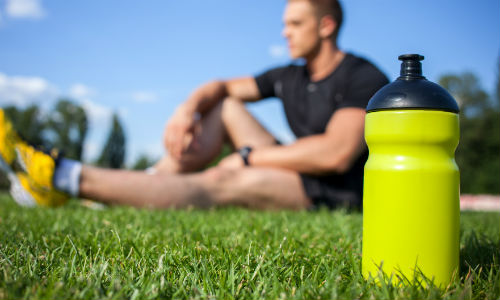The right way to eat during marathon training
- Overview
Understanding how your body works when it comes to nutrition and hydration is fundamental for making sure you can mentally and physically handle all the mileage you're going to be doing during your training block.
Keep reading to find out how nutrition can impact your training and help boost performance on the big day.
1. What to eat before a session
Your food training should start when your physical training plan starts. There are three main priorities:
- Addressing any underlying health imbalances
- Working out the best foods for energy
- And working out which foods you can tolerate.
Address any underlying imbalances
Before applying sports nutrition, it’s important to focus on the foundation of your health. If you have any underlying issues such as digestive concerns then you might want some expert advice.
For example, pineapple and papaya supply digestive enzymes and may aid digestion. Natural yoghurt is a good source of probiotic bacteria which may help support gut function and immunity in runners.
A nutritional therapist will be able to assess the problem and offer bespoke advice.
Foods to fuel your runs
Carbohydrate is your body’s main fuel. There are two main types of carbohydrate: ‘slow releasing’ and ‘fast releasing’. Fast releasing carbohydrates give a fast energy boost, and slow releasing carbohydrates provide energy more slowly over time. You’ll need a good balance of both carbohydrates to fuel your runs.
Fast releasing carbohydrates include: potatoes, honey, bananas, pineapple, fruit juices, white bread, white pasta and white rice.
Slow releasing carbohydrates include: oats, wholemeal rice, wholemeal bread and wholemeal pasta. Also non-starch vegetables like green leafy vegetables and vegetables with skins.

Ideally you need to eat breakfast two or three hours before a long run. This is something to practice before the big day and you might need to get up early.
A combination of oats (slow release), milk (or non-dairy milk like almond milk), honey (fast release) and banana (fast release) could be a good start.
Closer to the run, you might have a banana (fast release) or dilute juice drink (fast release) about an hour before. Remember to test this before race day though in case of any digestive issues.
Identify which foods you can tolerate
Exactly when and what to eat is unique to you. As you train more and run further if you find that some foods upset your system, then you can start to experiment with foods with less fibre such as potatoes or some white pasta.
Make sure you still eat fibre (oats, whole grains, vegetables, fruits) and well balanced meals away from the training sessions though.
Try adding herbs with soothing properties, like ginger and turmeric, which reduce inflammation, into your daily meals. A food diary could be useful, use it to record meals, training and how you felt.
Record all meals, snacks and drinks, because food reactions may occur 72 hours after eating.
2. What to eat during a session
During a race you need to stick with what you know. If you plan to use high energy gels and drinks you need to have tested the same brand and flavour during your training to avoid any surprises on race day.
Some of these gels and drinks require additional liquid, and can cause digestive discomfort if you forget to drink water with them. Some gels also contain caffeine, and tolerance of caffeine can vary.
It can be difficult to carry food during a marathon, but dried or pureed fruit may be an option to test in advance.

Hydration, hydration, hydration
It’s essential that you’re well hydrated before training and racing. You’ll need to carry drinks and make use of water handed out along the route.
It might be worth investing in a bottle belt so you can carry water easily without it getting in the way. Again, trial it out in advance to make sure you’re comfy.
Electrolyte tablets and liquids can also be useful, but look out for good quality ones without unnatural flavours and colours.
3. What to eat after a session
Immediately after running you may not have much of an appetite, but you should aim to refuel your body with carbohydrates and protein within 30 minutes to avoid an energy crash.
The main priority is carbohydrate, to replenish the used energy from your body. But you should also add protein, which can help recovery and repair the muscles.
The power of smoothies
Try a smoothie made from a pot of natural yoghurt or protein powder blended with fruit juice; or a banana blended with coconut water, yoghurt/protein powder and a couple of dessert spoons of almond butter.
Then as soon as you can, have a balanced meal of protein (chicken, turkey, eggs, meat or beans), slow releasing carbohydrate (wholemeal rice, quinoa, or wholemeal bread) vegetables, and healthy fats like olive oil and avocado.
Eating the right way after race day
For at least the week after the event, bring the immune system back to balance by eating colourful fruit and vegetables to provide vitamins. Remember to eat natural, hydrate, minimise your consumption of refined foods, and maximise your rest.
Last updated Monday 18 November 2024
First published on Friday 4 December 2015

